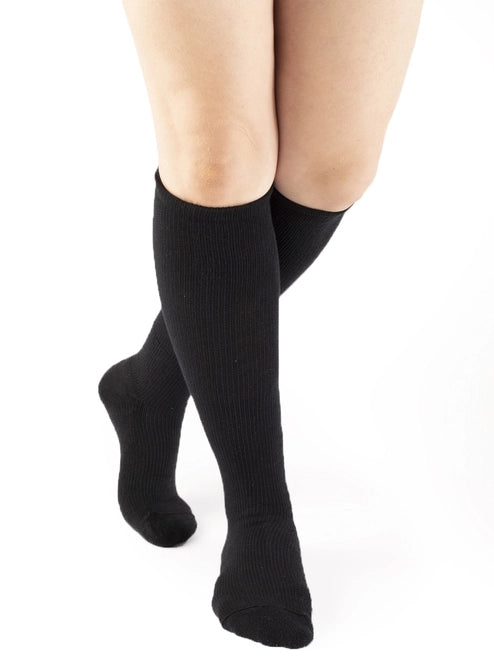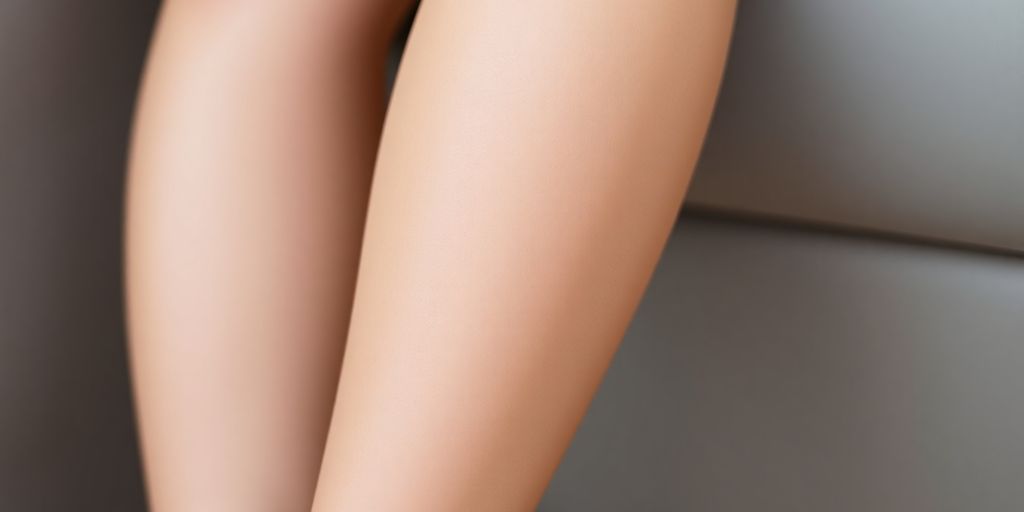Have you ever wondered how you could stay on your feet for hours on end at work? If you are employed as a nurse, you know that working long shifts (mostly standing up) is just part of the job requirements. Naturally, this can put a heavy toll on your feet, ankles, calves, knees, and thighs. As a result, many nurses turn to compression socks and similar compression wear for support.
However, this does not fully explain why compression socks are so popular in the nursing community. What do compression socks do that can help nurses more than people in other professions? What level of compression is best for nurses to use at work or at home? Is it safe for nurses to wear compression socks every single day? Finally, what are some of the best brands of compression socks for nurses? In today’s guide on everything you need to know about compression socks for nurses, we will answer all of these questions and much, much more!
Why Should Nurses Wear Compression Socks?
It’s important to make certain distinctions about the different duties and daily work schedules of nurses. Many nurses spend their days seated for hours on end, inputting patient info or managing the general operations of the hospital or medical clinic. Alternatively, most nurses have to stand all day attending to patients and assisting doctors. Since the vast majority of medical facilities are understaffed, nurses have become accustomed to 12-hour shifts (or longer).
For nurses that spend much of the day sitting down, issues like varicose veins, deep vein thrombosis, or poor circulation are all too common. On the other hand, nurses who spend their day moving from one hospital room to another are more likely to experience pain, inflammation, and joint stiffness. Either way, compression socks can help provide support to nurses before, during, and after work.
This is due to the fact that compression socks are designed to apply pressure that helps remove some of the strain put on the joints in the feet and legs. It can also reduce swelling and inflammation while simultaneously increasing blood flow to the extremities. Consequently, compression socks are often recommended for nurses and other people who are more likely to experience pain, discomfort, or chronic conditions in the feet and legs.
What Level Of Compression Socks Is Best For Nurses To Wear?
Compression socks apply consistent pressure to the soft tissue of your feet, ankles, legs, and knees. The degree of pressure varies based on the specific compression level of your socks. Moreover, the degree of pressure nurses need will depend on their specific reasons for wearing the socks in the first place.
For example, if you are a nurse working double shifts and standing on your feet all day, you may want moderate-level compression socks that do not constrict your feet or legs to the point of discomfort but still apply enough pressure to reduce pain and provide support to your joints. This way, you can get through your day without having swollen feet or feeling numbness in your toes. However, if you are a nurse who does not move around as much and instead wants compression socks that will just help increase blood flow, a light level of compression might be better. Either way, if you are using compression socks as part of a treatment for a medical condition, always make sure to consult your doctor before purchasing a pair of compression socks.
It’s also important to understand what is meant by “pressure” and “compression” when looking for the best compression socks for nurses. The degree of pressure in compression socks is measured in mmHg. The lower the number of mmHg, the less pressure the compression socks apply to your feet, ankles, and legs. Naturally, as the numbers increase, the pressure and constriction increase. Here is a brief overview of the general categories of compression socks:
- Light (8 to 15 mmHg) - Most nurses could probably benefit from light compression socks. These can help treat mild conditions, treat minor aches and pains, and increase overall blood flow to the lower extremities.
- Moderate (15 to 20 mmHg) - Moderate compression socks put more pressure on the feet and ankles, making them a better option for nurses who need consistent joint support throughout the day. Additionally, these can help nurses avoid inflammation, stiffness, or excessive pain after long shifts.
- Firm (20 to 30 mmHg) - In most cases, 20 mmHg or higher is reserved for medical conditions that need specific treatment plans. This might include moderate to severe arthritis, tendonitis, or carpal tunnel syndrome. You may not want to use firm compression socks during the work day, especially if you need to move around a lot, as it could limit mobility to a small degree. Instead, firm compression wear is better for the comfort of your own home or during your off time.
- Extra Firm (30 to 40 mmHg) - Extra firm compression socks put the most pressure on your body and are therefore reserved for more severe conditions. These may also be recommended to patients who suffer from chronic conditions that cause excessive pain, inflammation, or swelling. They are not recommended for nurses to use during the workday unless directly overseen by the prescribing doctor.
Is It OK To Wear Compression Socks Every Day?
In short, it is ok to wear compression socks every day. However, this does not mean that you should wear compression socks 24/7. This is especially true if you wear moderate, firm, or extra firm socks, as the degree of pressure could be applied for too long. For most people, compression socks should not be worn for more than 8 to 12 hours at a time (one shift for nurses). Many people choose to wear compression socks while they sleep and then have greater mobility during the day.
Either way, wearing compression socks all the time can cause more harm than good. In fact, if you try to wear moderate or high-pressure compression socks for days on end, it could end up restricting blood flow to your feet. Additionally, it could cause issues related to bacteria if you fail to remove the socks and clean your feet regularly.
The Best Compression Sock Brands For Nurses
Naturally, no two brands of compression socks are exactly alike. Some are made with better materials and designs that can last for years on end, even with daily use. Thus, some brands are better for nurses who need strong, reliable products to stay safe and comfortable at work. Here are some of the best brands of compression socks to look for:
Any of the brands above meet the requirements to provide quality comfort and treatment to nurses. So, if you are working as a nurse and looking for compression socks to help ease pain, reduce inflammation, treat underlying health conditions, or simply support your mobility, any of these brands can offer quality compression socks to meet your needs!
We hope you found this guide all about compression socks for nurses both useful and informative! Are you currently in the market for compression socks or other compression wear? If so, be sure to reach out to Compression Health today!




Share:
Compression Gloves Guide
Compression Sleeve Guide